Keyword difficulty scores are a metric that appears in every paid keyword research tool. Each SEO tool has its own proprietary keyword difficulty score.
But are they reliable? And are they making you miss out on valuable keywords?
The first thing to note about keyword difficulty scores is that they give different results for the same keyword, depending on which tool you are using.
You can see this in KWFinder and SEMrush, for example. Just type in any keyword and you’ll find that they each give completely different keyword difficulty scores for the same keyword.
And this raises an important question.
If these tools give different difficulty scores for the same keyword, which one is correct? Or are none of them correct?
Should We Stop Using Keyword Research Tools?
Some people say that the metrics used in SEO tools are so arbitrary and misleading that you should stop using them altogether.
This is the view of Income School’s Ricky Kesler and Jim Harmer.
They say that the search volumes in most SEO tools are completely wrong. And they advise their followers to stop using keyword research tools:
Watch This Video: ‘Stop Using Keyword Research Tools (And do this instead!) (13 mins 47 secs)’
I might not go so far as Ricky and Jim, but they make a good point.
Here are some useful articles about keyword difficulty:
- The Big, Vital, All-in-One Guide to Keyword Difficulty
- There’s A Better Way To Measure Keyword Difficulty
Keyword Difficulty Scores are Inaccurate
But I agree with them on one point: keyword difficulty scores in SEO tools are hopelessly inaccurate. They either underestimate how difficult it’s going to be to rank for a given keyword or they make it seem harder than it actually is.
Either way, it’s not helpful. And if you’re using those KD scores to decide which keywords to target, you could be passing up great opportunities without realizing it.
Here’s a case study that illustrates what I mean.
A Tale of Two Keywords
It’s a tale of two keywords. One was easy to rank for and the other wasn’t.
I’ll be showing you how KD score for one of these words was seriously misleading.
And I’ll also be showing you a much more reliable indicator than keyword difficulty scores. It’s a metric you can get without paying a cent and it’s never wrong.
The keyword tool I’ll be referring to in this case study is KWFinder. But this is no reflection on KWFinder as an SEO tool. Rather, it’s a reflection on the whole concept of keyword difficulty scores. All keyword difficulty scores, in all SEO tools, are to some extent arbitrary metrics that can lead you astray.
So here’s the case study:
Keyword #1
The first keyword I wanted to rank for was: ‘types of SEO’.These are the metrics for that keyword in KWFinder:
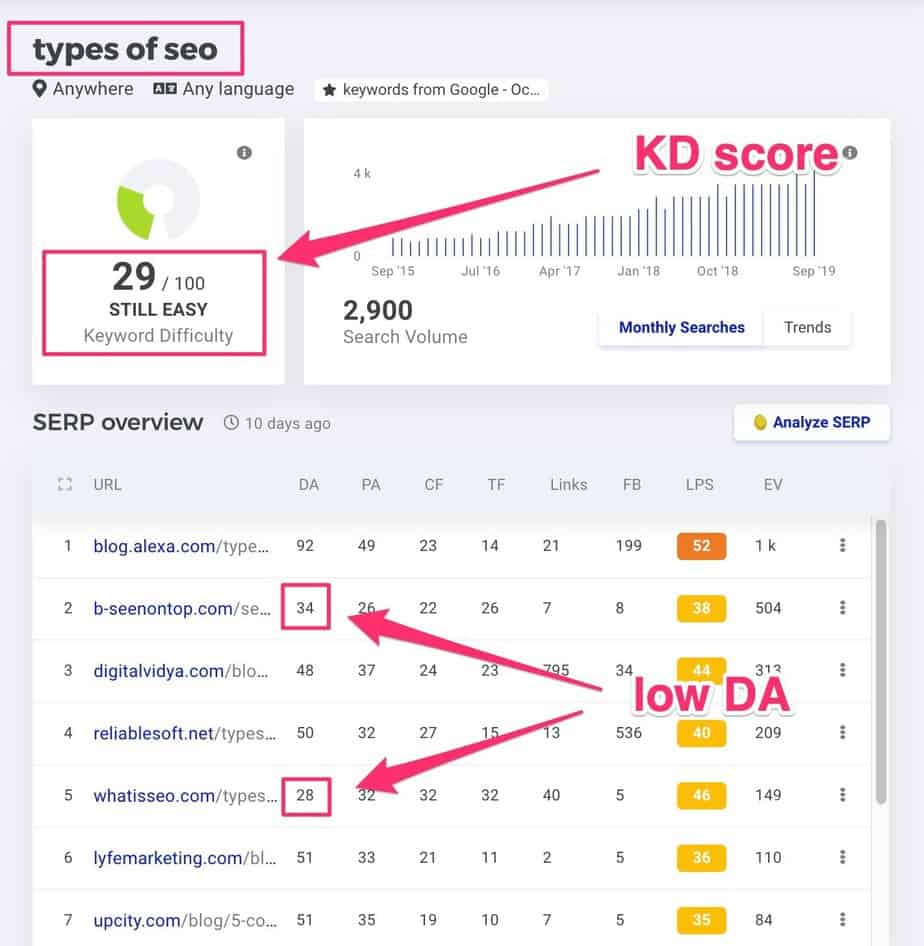
The KD score is low (29). There are also two websites with relatively low domain authority (34 and 28) that rank on Page #1 for this keyword.
Taken together, those two metrics were a green light for me: I decided to go ahead and write a longform article targeting the keyword ‘types of seo’.
But there was one metric I hadn’t looked at.
It’s a metric that KWFinder doesn’t provide.
But it’s a vital metric if you want to know your chances of ranking on Page #1 for any given keyword. In fact, it’s a more reliable predictor of whether or not you’ll rank on Page #1 than any other metric I know of.
I’ll show you what it is in a moment.
Keyword #2
The second keyword was ‘google bert algorithm’.
The BERT algorithm update was released less than 2 weeks ago, so I figured I would get in early and rank for it before the competition gets too steep.
These are the metrics in KWFinder for ‘google bert algorithm’:
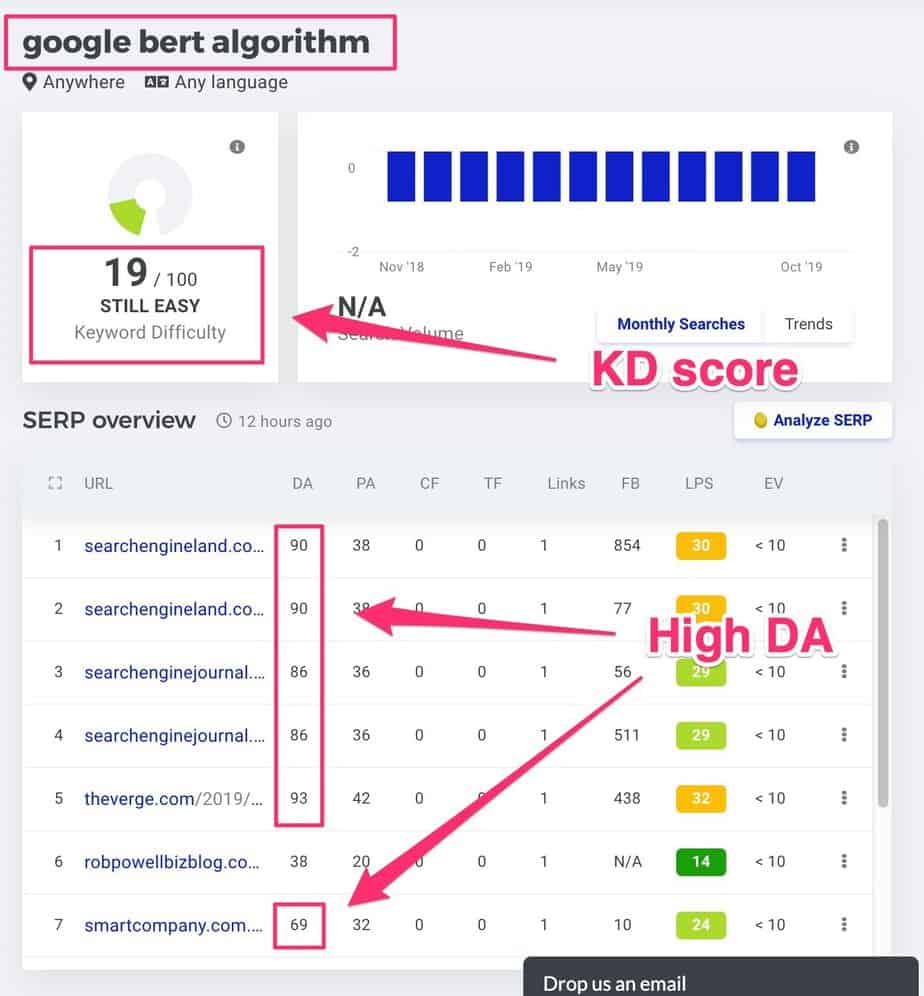
As you can see, it has an even lower KD score than the previous keyword.
But in terms of domain authority, the competition on Page #1 is quite stiff. (My page ranks in Position #6, but when I originally checked the metrics for this keyword, there were no websites on Page #1 with DA of less than 40).
Based on the DA of the sites that rank on Page #1 for this keyword, you might think that ‘google bert algorithm’ is going to be harder to rank for than ‘types of seo’.
But there was a metric I didn’t look at.
It’s called ‘results in Google’ and its displayed at the top of every search results page.
Here’s the ‘results in Google’ for Keyword #1:
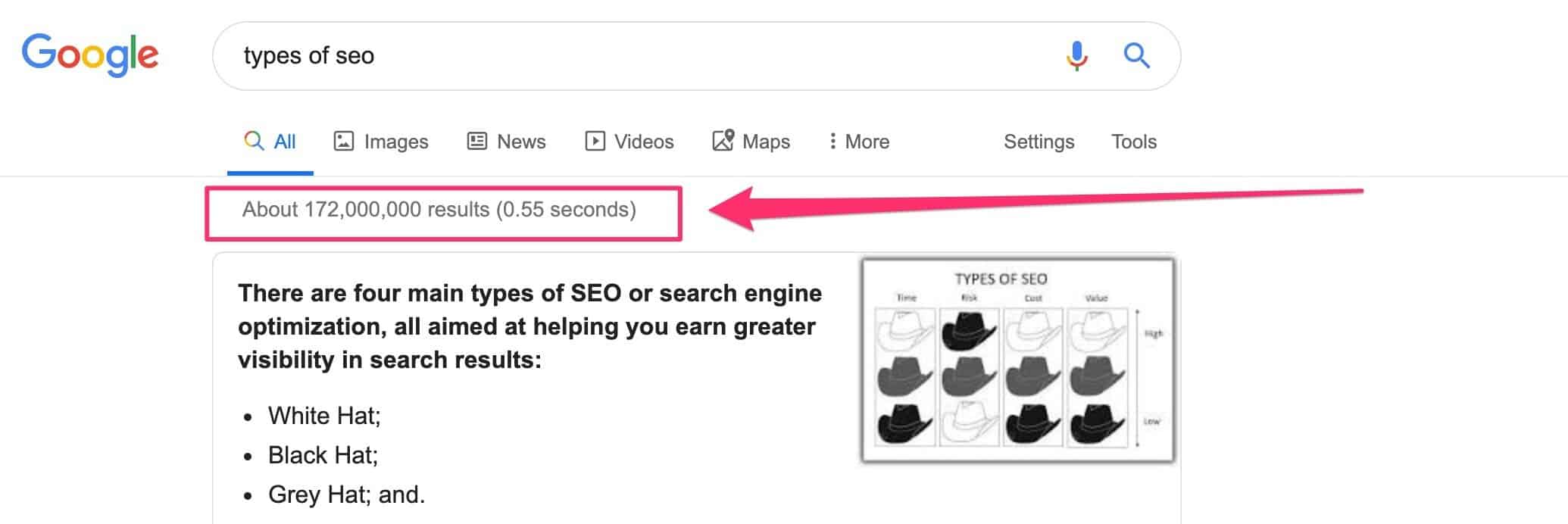
172 million results for the keyword ‘types of seo’. That’s a lot of competition!
Here’s the number of ‘results in Google’ for Keyword #2:

Just over a 2 million results in Google for this keyword.
That’s a big difference!
Keyword #1 has 86 x the level of competition in the Google search results!
And this explains the difference in how my pages ranked for these two keywords.
How the Two Keywords Ranked On Google
Keyword #2ranked on Google immediately.
My web page targeting ‘google bert algorithm’ was on Page #1 of Google within 5 minutes of submitting it to Google Search Console (it shows 10 hours in the screenshot because it wasn’t until the next day that I realized I needed a screenshot of it):
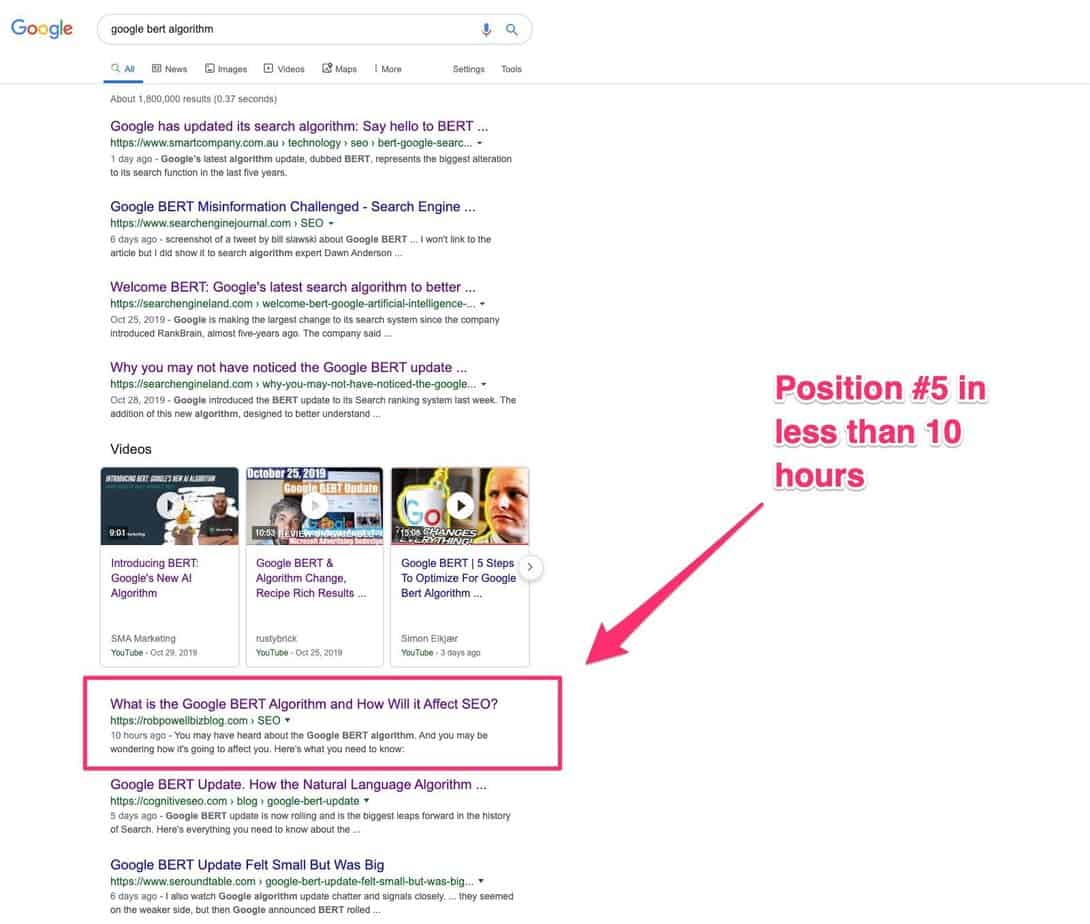
So how did keyword #1 rank? The one that targeted ‘types of seo’? It ranked in Position #88:
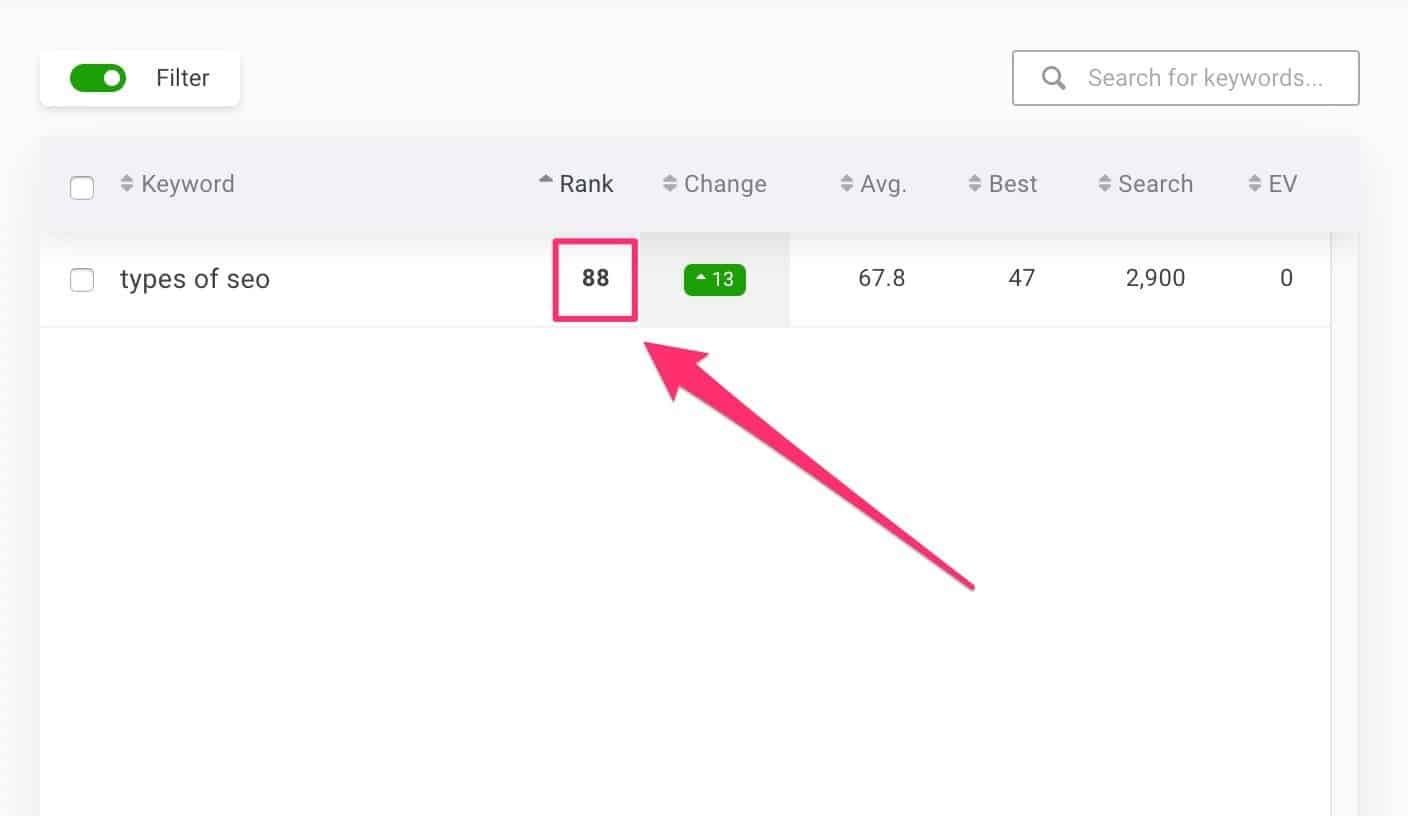
Key Takeaways
So what are the key takeaways?
#1 – Check the number of results in Google
Always check the number of results that appear in Google for any given keyword.
In my experience, anything under about 5 million will be easy to rank for. Anything over 50 million is going to be very competitive.
#2 – Don’t rely too much on keyword difficulty scores
Don’t be guided by keyword difficulty scores in SEO tools. These scores do not, in my experience, take into account the number of results that appear in Google for a given keyword.
#3 – Check domain authority in the search results
The number of results in Google search for a given keyword is far more important than the domain authority of the sites that currently rank on Page #1 for that keyword.
In my example, the Keyword #2 faced much stiffer competition in terms of DA than the Keyword #1. But it ranked on Page #1 of Google because the total number of results in Google was a fraction of the total results for Keyword #1.
Conclusion
Vast amounts of money are spent every month in subscriptions to keyword research tools. And keyword difficulty scores are one of the metrics that people pay all that money for.
But the best predictor, in my experience, of whether you can rank on Google for a given keyword is the number of results that appear in Google for that keyword.
This metric is a line of text that appears just below the search box and it tells you how many million web pages appear in the results for that keyword.
As well as being the best predictor of your ability to rank for a given keyword, it is also 100% free.